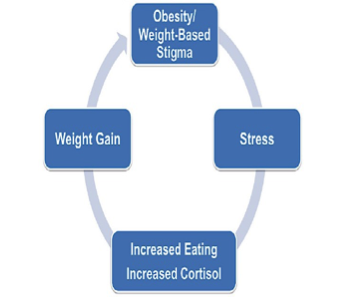Psychological and Health Consequences
People think that subjecting persons to weight stigmatization will lead them to seek ways to achieve to weight loss. However, the opposite is showing to be true. Research has shown that the psychological consequences of weightism are detrimental. A model proposed by Tomiyama (2014) called the Cyclic Obesity/Weight-based Stigma (COBWEBS) model, indicates that there is a “vicious cycle” that people experience as victims of weightism. When a person is exposed to weight stigmatization, he or she experiences stress, which then creates a rise in the stress hormone cortisol. This is accompanied by increased eating and subsequent weight gain. This cycle is repeated over and over as a positive feedback loop, resulting in greater levels of stress, higher secretion of cortisol, and further weight gain. In other words, “fat shaming” causes people to become stressed and eat more calories and gain more weight (Toyama, 2014).

(Toyama, 2014)
In a study of 93 women, exposure to weight stigmatizing information made women who are overweight, but not women who are normal weight, eat more calories and feel less in control of their eating (Schvey et al., 2011). Additional research conducted on self-perceived overweight women who were exposed to a weight-stigmatizing news article indicated that the article contributed to greater calorie consumption and less control over consumption as compared to women who did not perceive themselves as overweight (Major et al., 2014).
Weight stigmatization also has a range of negative psychological outcomes such as increased depression and lower self-esteem, poor body image, higher risk of suicidality, and increased incidences of eating disorders. In fact, studies have shown that weight stigma is positively correlated with unhealthy eating behaviors such as refusing to diet, binge eating, eating in secret, and avoidance of exercise (Schvey et al., 2011). If the cycle of fat shaming, stress, and increased calorie consumption continues, the worse these negative health outcomes and behaviors become.
Clinical and Policy Considerations
The stigma that my tween might face, and the associated potential negative health and psychological consequences highlight the need to address this discrimination on a national policy level. Only those classified as morbidly obese are provisionally protected by federal legislation, highlighting that moderately overweight or obese persons have virtually no protection against discrimination by employers, healthcare providers, and the like (Tomiyama, 2014). Additionally, weightism is not considered to be an illegal form of discrimination and there are no federal laws to protect against discrimination based upon appearance (Warhurst et al., 2009). Weight stigma and its associated negative health consequences are not included in national decision-making and policy and increased awareness is needed.
There is a need to provide education and sensitivity training on weight stigma to scientists, health care providers, and dietitians working in obesity prevention programs and obesity treatment. Moreover, the types of public health campaigns targeting obesity must be addressed with a focus on increasing healthy behaviors as opposed to emphasizing weight stigmatization. A recent national study of 1,014 adults showed that those who viewed stigmatizing content from obesity public health campaigns received the most negative ratings and lowest intention to comply with the message content. These results were compared to campaigns containing positive messages with no mention of obesity or stigmatizing content, which focused on healthy behaviors as being more acceptable and inspiring (Puhl & Suh, 2015).
Along with changing public health campaigns, more needs to be done to promote positive images of people who are classified as overweight and obese in the media. This can be accomplished with more campaigns designed to increase public awareness of the negative consequences of weightism, as well as efforts to ensure that all persons are portrayed in the media without bias. Additionally, the television and film industry needs to be educated about these detrimental effects to ensure that stigmatization of persons classified as overweight and obese is no longer tolerated and that weight-based stereotypes are no longer accepted (Schvey et al., 2011).
How Can We Help
It is vitally important to focus attention on bolstering self-esteem, reducing stress, alleviating depression, and enhancing self-acceptance if both the psychological and health consequences of weightism and overweight and obesity are to be ameliorated. With obesity rates increasing, so increases weightism. But as we can see, weight stigmatization leads to more stress, higher cortisol levels, increases in weight, and forms a vicious cycle that results in poor self-esteem, depression, increased suicidality, and other damaging psychological consequences. Efforts in public policy, federal and state anti-discrimination laws, anti-weightism public health campaigns, an elimination of negative obesity stereotypes in the media, and a general awareness and empathy on a societal level is the only way to combat this undermining and damaging form of oppression. Additionally, it is vital to help people increase self-esteem, self-efficacy, alleviate depression, and improve and address their emotional response to stress and eating.
As a clinician, I feel it is imperative to remain compassionate, educated, and open to my tween’s potential future experience with weightism so that she might be spared from harm. I hope to see an end to weight stigmatization, though I know that this stigma is deeply ingrained within society’s consciousness. However, I remain optimistic that with compassion, kindness, and open hearts, this insidious form of discrimination can be eradicated and that we all can adopt a more positive, productive, and empowering view of what is “ideal.”
References
Major, B., Hunger, J. M., Bunyan, D. P., & Miller, C. T. (2014). The ironic effects of weight stigma. Journal of Experimental Social Psychology, 51, 74-80. https://doi.org/10.1016/j.jesp.2013.11.009
O’Reilly, G., Cook, L., Spruijt‐Metz, D., & Black, D. (2014). Mindfulness‐based interventions for obesity‐related eating behaviours: A literature review. Obesity Reviews, 15(6), 453-461. https://doi.org/10.1111/obr.12156
Puhl, R., & Suh, Y. (2015). Health consequences of weight stigma: Implications for obesity prevention and treatment. Current Obesity Reports, 4(2), 182-190. https://doi.org/10.1007/s13679-015-0153-z
Schvey, N. A., Puhl, R. M., & Brownell, K. D. (2011). The impact of weight stigma on caloric consumption. Obesity, 19(10), 1957-1962. https://doi.org/10.1038/oby.2011.204
Tomiyama, A. J. (2014). Weight stigma is stressful. A review of evidence for the cyclic obesity/weight-based stigma model. Appetite, 82, 8-15. https://doi.org/10.1016/j.appet.2014.06.108
Warhurst, C., Van Den Broek, D., Hall, R., & Nickson, D. (2009). Lookism: The new frontier of employment discrimination? Journal of Industrial Relations, 51(1), 131-136. https://doi.org/10.1177/0022185608096808


Recent Comments